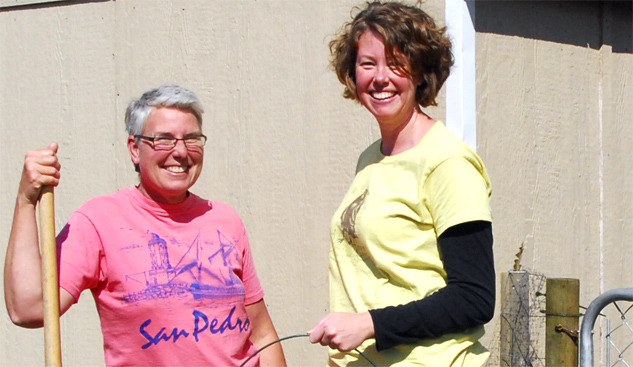Everything serves a purpose on Dog Mountain Farm, even the weeds.
Trees and gardens produce fruits and vegetables, chickens and ducks produce eggs, various other animals provide meat, and all provide fertilizer components. The weeds are food and work for the farm pig.
“Gabriel’s tilling for me,” says Dog Mountain Farm owner Cindy Krepky, looking over at the animal, busy tearing up a small square of land for more garden space. She pens the pig wherever she wants land cleared, and he goes to work, digging and eating plants, roots and all. Even tenacious dandelions don’t grow back.
Two beautiful Percherons are the closest things the farm has to window-dressing, and they earn their keep by providing raw materials for fertilizer, and appearing in parades. The draft horses have also hauled the farm’s produce down the hill to Carnation.
It’s a small, but working farm that Cindy and her husband Dave started 11 years ago, almost at the top of Tolt River Road.
“Most people would call this a micro-farm because we have so few acres,” Krepky said, only five.
In the past two years, the farm has grown into more than home and office for the Krepkys. They’ve started programs focused on sustainable agriculture, and want to set the example.
“What we’re trying to demonstrate is more of a closed system, where you have few inputs to the farm,” Krepky said.
Managing the products of the farm, 250 different fruits and vegetables, fiber from sheep, eggs from chickens and ducks, and meat from the animals they butcher, is the focus of the two year-old School of Lost Arts (www.lostartsschool.org).
Classes at the school cover producing, preserving, and enjoying locally-grown foods, and hands-on work is required.
“They (students) get to participate in the process,” said School Director Erin Chamberlain, whether it’s kneading dough for a hearth breads class, or picking the fruit in the orchard to make jam.
Chamberlain came here because she wanted to play a role in the expanding local food movement.
Last summer, Chamberlain scheduled a full slate of Culinary Traditions classes on making bread, jams and jellies, cheese, butter, and the art of fermentation. She’s also coordinated Young Farmers Day Camps which bring children up to age 12 out to the farm to experience food production, and launched “Locavore Lunches” modeled after Dog Mountain’s monthly farm dinners, but with what Krepky calls “a true farm-to-table experience.”
Locavore Lunchers are invited to tour the farm with the chef, to hand-pick the ingredients for their meal. Then, as with the farm dinners, they can watch the chef work in the outdoor kitchen and enjoy the meal in the farm’s orchard.
The school, farm dinners and locavore lunches all shut down for the winter months. However, the farm will host a harvest open house Saturday, Oct. 22, for people to visit the farm and enjoy some freshly-pressed cider.
School of the Lost Arts will return next year, along with the farm’s other programs and volunteer opportunities. Krepky, passionate about education, is always trying to help people understand the need for local, sustainable farms, through various programs.
“The whole idea there is to give them some education on nutrition and eating locally, seasonally,” she says.



